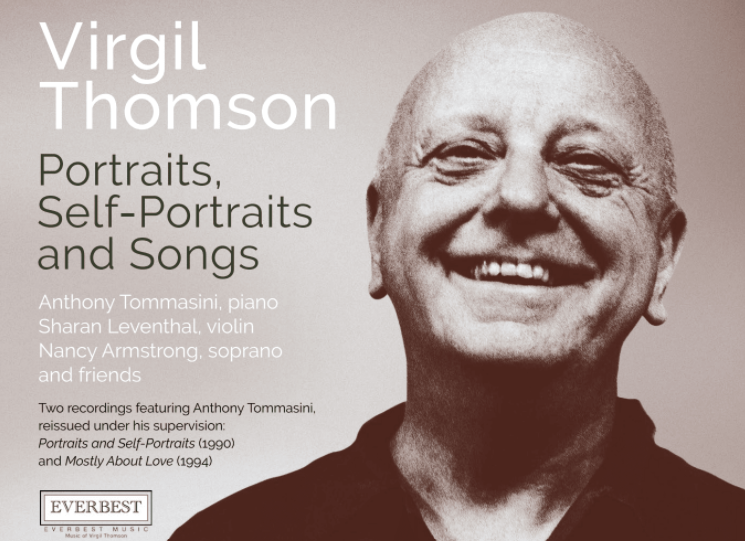On Oct. 23, 2020, the Virgil Thomson Foundation reissued two critically acclaimed albums of Virgil Thomson’s composition. New York Times’ chief classical music critic Anthony Tommasini and a number of other musicians recorded the two albums, “Portraits and Self-Portraits” and “Mostly About Love” in the early 90s. Thomson was born in Kansas City, and donated a number of his letters and manuscripts to UMKC. In many ways, his music has a distinct emotional connection to Kansas City and the Midwest as a whole. Fans of his work may know him as the greatest composer-critic, as he was both a writer and a musician.
With 68 tracks total, the reissued albums represent the career of one of the most important composers of America’s 20th century. Before his death in 1989, Thomson mentored Tommasini, who has since written two books about the late composer.
In an exclusive interview, Tommasini gave personal insight into the albums’ original recording process, and what it means to reissue these albums at this time for music.
Allison Harris: What was your reaction to the news that these albums were going to be reissued?
Anthony Tommasini: The “Portraits and Self-Portraits” album came out in ‘90, and then the vocal music record in ‘94. And that was a very different era of recording. I got grants for each one, partially funded in order from the National Endowment for the Arts. They had a program at the time that supported the recording of overlooked American music. So both of these programs were perfect for that grant. But there wasn’t the online component of the digital component of recording [that] there is now, so besides that, I’m delighted that they’re going to be released again and come to attention. Because I believe in all this music tremendously. Besides the actual recordings coming out, they can go to digital services and have much, much wider distribution than was possible back then. So it’s really great. It should, you know, it should help. And for people who know me only as a critic, it’s kind of fun for them to say, “Oh, yeah, back then [He] could actually play the piano. So, I’m very excited. Also because [there’s] a long, complicated question of “why is certain music overlooked? And why does it stay overlooked?” And his music remains somewhat, you know, overlooked. So I’m very happy to keep calling attention to it.
A.H.: What was it like to be a part of the recording process all those years ago?
A.T.: Well, I was a pretty experienced pianist. I mean, my real training is in music. I have degrees in music, remedial, and I got my doctorate in Boston University. So I played a lot, but I hadn’t made actual studio recordings. The thing that I’d heard I anticipated, but I didn’t know how striking it would be. There’s a misconception [about recording] that, “Oh, all the pressure’s off.” You know, “If it doesn’t go right, just record it again.” Well, you have a whole room of people listening to you and following every tiny little mistake you made. And in there, time is expensive. If it’s a little two-minute piano piece, I can’t play it 10 times. Then you get into the question of editing. So it’s, “Everything’s good, except for one little passage. So you want to splice that in from another take?” Especially the solo stuff, because it was just me. Then by the time we did the vocal music record, I was a veteran. I felt like I was much more comfortable. So yeah, but it was a wonderful experience.
A.H.: What does it mean to you for these works of his to be reissued in this day and age?A.T.: It’s very, very challenging. Obviously, we’re all swept up, especially at this very moment with politics and, of course, preventing illness and loss of life. Those are the paramount concerns. But the impact of the shutdown on the performing arts is devastating. I keep thinking of 9/11. Four days after this horrific attack, the New York City Opera was opening in the next week. Broadway was back by the end of September. Everything was back. Carnegie Hall, Lincoln, the rest of Lincoln Center, even restaurants. It was like the arts were saying, “Even in the face of this, here we are.” In the middle of this horror, you could go to a Broadway show and laugh your head off. And that was an American response somehow. But who could have imagined that sitting next to somebody in Carnegie Hall, or the Metropolitan Opera would be risky. Or at a Broadway show. No one conceived such a thing. And all the artists, most performing artists are freelancers. They get paid gig to gig. I’ve talked to especially younger performers, who’ve lost everything, everything, you know. So it’s just devastating. All that said, we have to go on. Music is not going away. It’s still being made. There are all these live-stream things that are happening, sometimes from musicians’ apartments, or sometimes in concert halls with people being very, very safe. And recordings, of course, are still happening. So it’s like a little consolation to me that even amid all this loss and fear, there’s music to enjoy. It’s still being made. What do we want? Peace and prosperity and health for others, so that we can enrich our lives with things like the arts.
allison.harris@mail.umkc.edu








